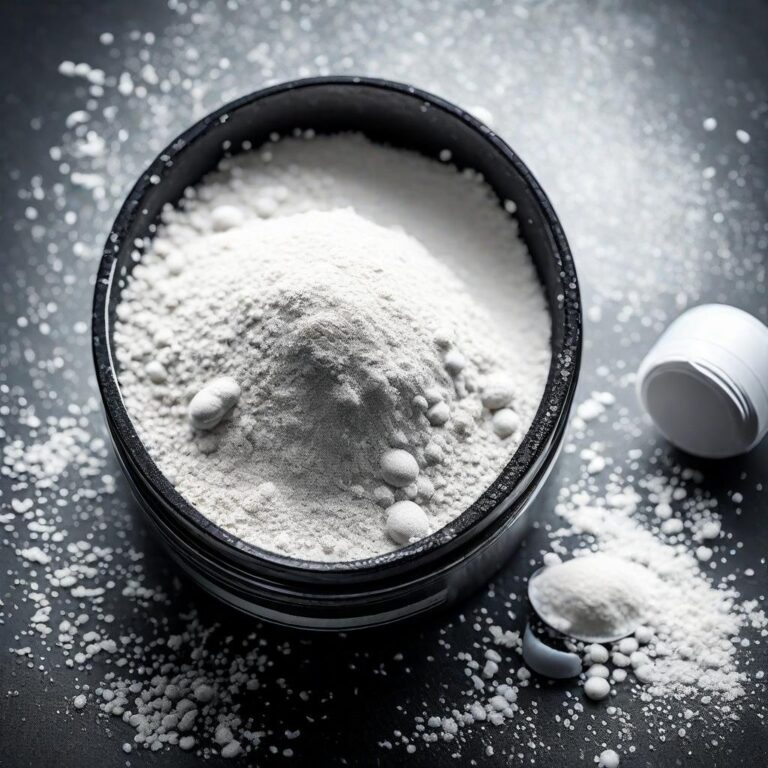Is Creatine Worth It?
Is Creatine Worth It?
Creatine is known for enhancing strength, endurance and muscle recovery. Studies also found proof that creatine boosts cognitive function.
While creatine is generally considered safe, some individuals may experience minor side effects like stomach cramps or dehydration.
The overall benefits in strength, muscle growth, endurance, and cognitive function make creatine a valuable supplement for casual lifters, bodybuilders and strongmen.
So, Is Creatine Worth It?

How Does Creatine Work?
Cellular Energy Boost
Creatine has the ability to enhance cellular energy availability. This is achieved through the conversion of creatine into phosphocreatine within the body.
Phosphocreatine acts as a rapid and accessible energy reserve, particularly during high-intensity activities like weightlifting or sprinting.
Creatine’s impact on cellular energy is not only crucial for immediate bursts of activity but also supports sustained efforts during prolonged exercises. This dynamic role of creatine contributes significantly to its popularity among athletes and fitness enthusiasts.
Supporting General Health and Fitness
The relationship between creatine supplementation and overall health is a compelling aspect. A study highlighted in the National Center for Biotechnology Information (NCBI) article emphasizes that creatine supplementation supports general health, fitness, and well-being across various life stages.
This comprehensive support extends beyond the muscle-centric benefits commonly associated with creatine, encompassing broader aspects of health and fitness.
Resistance Training Synergy
The synergy between creatine supplementation and resistance training is a well-documented phenomenon. The referenced study underscores that creatine, particularly when combined with resistance training, promotes gains in strength and aids in maintaining or increasing muscle mass, a particularly noteworthy advantage for older individuals.

Health and Therapeutic Benefits
Beyond the realms of fitness, creatine supplementation offers a spectrum of health and therapeutic benefits. The NCBI study suggests potential advantages such as lowering cholesterol and triglycerides, managing blood lipid levels, reducing fat accumulation on the liver, and decreasing homocysteine, thereby mitigating the risk of heart disease.
Creatine’s role as an antioxidant adds another layer of health benefits, and its influence on glycemic control can be advantageous for individuals managing blood sugar levels.
Enhancing Cellular Metabolism
Delving into the cellular level, increased availability of creatine in tissues can enhance cellular metabolism. This becomes particularly crucial when oxygen availability is compromised, potentially offering a protective effect in challenging physiological conditions.
In essence, understanding how creatine works involves recognizing its multi-faceted contributions to cellular energy, general health, and therapeutic support, making it a versatile and valuable supplement.
Creatine And Its Impact On Health
Positive Impacts
Liver Health and Fat Reduction
Research suggests creatine may play a role in reducing fat accumulation in the liver, promoting optimal liver function and overall well-being.
Heart Health
Creatine has shown promise in reducing homocysteine levels, contributing to cardiovascular well-being and potentially reducing the risk of heart disease.
Antioxidant Benefits
Acting as an antioxidant, creatine provides a defense against oxidative stress, offering protection at the cellular level.
Blood Sugar Management
For individuals managing blood sugar levels, creatine may assist in maintaining stability, contributing to overall metabolic health.
Potential Drawbacks
Kidney Impact
Some individuals may experience potential kidney-related issues with creatine supplementation. Consulting with a medical professional is crucial, especially for those with pre-existing kidney conditions.
Liver Sensitivity
While creatine appears beneficial for liver health, individuals with existing liver conditions should exercise caution and seek medical advice before supplementing.
Dehydration Risk
Creatine may contribute to dehydration in some cases. Adequate hydration is crucial, and individuals should ensure they maintain proper water intake during creatine supplementation.
Note:
Understanding these positive impacts and potential drawbacks empowers individuals to make informed decisions about incorporating creatine into their fitness routine, with a focus on overall health and well-being. Always consult with a healthcare professional before starting any supplementation regimen, especially if pre-existing health conditions are a concern.
For a detailed exploration of creatine’s impact on health, refer to this study.
Creatine and Muscle Growth
Synergy with Training
Studies consistently reveal that creatine’s effectiveness amplifies in individuals engaged in regular, high-intensity training. The synergy between creatine supplementation and structured workouts enhances muscle protein synthesis, a key factor in muscle growth. Creatine works perfectly during bulking phase.
Cellular Hydration
Creatine also promotes cellular hydration by pulling water into muscle cells. This increased cell volume not only contributes to a fuller, more pumped appearance but also stimulates mechanisms for muscle growth at the cellular level.
Myostatin Regulation
Scientific evidence suggests that creatine may play a role in downregulating myostatin, a protein that limits muscle growth. By modulating myostatin levels, creatine potentially creates a more conducive environment for muscle development.
Muscle Fiber Type Impact
Research indicates that creatine supplementation may influence muscle fiber composition, particularly an increase in type II muscle fibers. These fast-twitch fibers are crucial for explosive movements and hypertrophy, contributing to overall muscle growth.
Explore Further
For a deeper dive into the scientific intricacies of creatine’s impact on muscle growth, refer to this detailed study. It’s a data-driven exploration shedding light on the physiological aspects of how creatine translates into tangible muscle gains.
Sources Of Creatine
Dietary Sources
Creatine is naturally present in red meat, seafood, and animal milk, constituting about 50% of daily intake. A protein-rich diet is fundamental for a natural creatine boost.

Endogenous Production
The body produces 1 to 2 grams of creatine daily in the liver, kidneys, and pancreas, ensuring a consistent supply without external sources.
Supplemental Boost
Creatine supplements, especially powders, offer a convenient option for an extra boost, providing 3-5 grams daily for enhanced strength and muscle growth.
Body Distribution
Approximately 95% of creatine goes to skeletal muscles, fueling energy-demanding activities, while the remaining 5% contributes to vital organs.
Benefits Of Taking Creatine
- Enhanced Cognitive Function: Creatine supplementation shows potential in improving cognitive performance, benefiting both mental focus and reaction time.
- Mitigation of Neurological Diseases: Research suggests creatine may have neuroprotective effects, offering promise in mitigating neurological diseases.
- Bone Health: Emerging studies indicate a positive association between creatine intake and bone health, potentially contributing to increased bone mineral density.
- Antioxidant Properties: Creatine acts as an antioxidant, combating oxidative stress and supporting overall cellular health.
- Increased Strength: Creatine enhances ATP activation, leading to improved strength, crucial for performance in various physical activities.
- Cellular Hydration: Creatine promotes water retention in muscle cells, contributing to increased cell volume and potential benefits in muscle function.
Drawbacks Of Taking Creatine
- Gastrointestinal Distress: Some individuals may experience stomach discomfort, bloating, or cramping as a common side effect of creatine supplementation.
- Water Weight Gain: Creatine can lead to increased water retention in muscle cells, potentially causing temporary weight gain, which may be undesirable for certain individuals.
- Kidney Strain: While debated, individuals with pre-existing kidney conditions may need caution, as creatine metabolism may slightly increase strain on the kidneys.
- Individual Variability: Responses to creatine vary; some individuals may experience minimal benefits or even adverse effects.
Note: People with kidney or liver problems should always consult taking creatine with a medical professional.
Takeaway
- Multidimensional Benefits: Creatine offers not only muscle growth and strength improvements but extends to cognitive function enhancement, potential neuroprotection, and support for bone health.
- Versatility in Application: Creatine’s antioxidant properties and connective tissue strengthening aspects contribute to overall cellular health and injury prevention.
- Scientific Backing: Scientific studies indicate creatine’s impact on muscle growth involves ATP activation, while its neuroprotective potential and positive influence on bone density add layers to its significance.
- Considerations for Use: Some individuals might experience gastrointestinal discomfort, water weight gain, potential kidney strain, and individual variability. Individuals with liver or kidney issues should seek medical advice before creatine supplementation.
In conclusion, creatine proves valuable for diverse benefits, supported by scientific evidence. Understanding potential drawbacks and considering individual health factors are crucial for informed decisions regarding its use.
FAQ:
Is creatine safe for long-term use, and are there any known side effects?
Is the loading phase necessary when starting creatine supplementation?
Does creatine cause water retention, and is this detrimental to overall health?
Creatine is generally considered safe for long-term use. However, individual responses vary, and potential side effects may appear.
No, a loading phase is not essential. Starting with a maintenance dose of 3-5 grams per day is sufficient to reap the benefits over time.
Creatine leads to increased water retention in muscle cells. While it may cause temporary weight gain, it is not considered detrimental to overall health.
Is creatine suitable for women?
Can creatine help with muscle recovery after intense workouts?
Can creatine be taken by older adults, and does it provide the same benefits?
Creatine is beneficial for women, offering the same advantages as for men. While some may experience bloating initially, it’s usually temporary, and the weight gain is often attributed to increased muscle mass, not fat.
Yes, creatine may aid in muscle recovery by replenishing ATP levels and supporting cellular hydration, enhancing the recovery process after strenuous exercise.
Creatine supplementation can be beneficial for older adults, potentially supporting muscle mass, strength, and cognitive function, although individual responses may vary.
